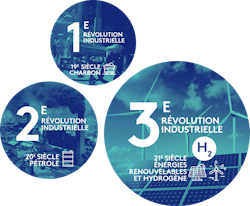What is Hydrogen ?
It is the chemical element of atomic number 1, the first of Mendeleev's painting and the most abundant in the universe: 75% by mass and 92% by number of atoms.
It occurs very rarely in its natural state because it is generally combined with other atoms: it is found in water, oil or natural gas. Hydrogen is not a primary energy source but a secondary chemical energy. This is why it is first considered as an energy carrier (which transports energy).
“I believe that water will one day be used as a fuel, that the hydrogen and oxygen it contains, used alone or simultaneously, will provide an inexhaustible source of heat and light of an intensity that coal cannot have.”
This premonition dates back to 1874, in Jules Verne's novel L'Île mystérieuse. Today, what is wrongly called the "water engine" is no longer quite a writer's dream. Of course, it is not yet a question of pouring water into its reservoir, but thanks to dihydrogen, produced from water and emitting only water, fiction is becoming a reality.
How to produce it ?
The production of hydrogen, or more precisely dihydrogen, is most often obtained by a process of chemical extraction of fossil hydrocarbons, mainly methane, coal and oil cuts (steam reforming of natural gas, gasification and pyrolysis of biomass etc).
The electrolysis of water, thermochemical or photochemical decomposition of water, or organical production from algae or bacteria, are totally different processes, also industrialized on a smaller scale, that allow a completely green production.
Currently in the world, 95% of hydrogen is produced from fossil fuels. The challenge: to develop clean production from water electrolysis using renewable energies. This is called "green" hydrogen.

The advantages of hydrogen
It is inexhaustible
On land, the most abundant source of hydrogen is water. During electrolysis and electrochemical conversion processes via the fuel cell, the only releases are oxygen and water vapour. Its availability is therefore infinite.
It is full of energy
Although its density is very low, which means that it must be compressed or liquefied, hydrogen represents an exceptional energy density!
1 kg of hydrogen releases :
- 4.1x more energy than 1kg of coal
- 2.8x more than 1kg of gasoline
- 2.4x more than 1kg of natural gas
It is the best ally of renewable energies
Hydrogen makes it possible to store surplus renewable energy in the long term so that it can be reused later.

Double battery and hydrogen storage of Energy Observer
It is lightweight
Despite a lower theoretical efficiency than battery storage, hydrogen storage is up to 10 times lighter for mobility. This light weight saves a lot of energy.
It is clean and quiet
In particular in the field of transport, it emits neither greenhouse gases nor pollutants when it comes from renewable sources. Combined with electromobility, it also has the advantage of being very quiet.
It recharges quickly
Filling up with hydrogen takes only a few minutes compared to several hours for its battery equivalent. A major asset for the electric mobility of tomorrow.
Hydrogen : the Energy Revolution on the way
Greenhouse gas emissions are due to the intensive exploitation of fossil fuels, which has enabled the 1st and 2nd revolutions in industry. Each of them has its own energies and infrastructures.
Making the third industrial revolution possible : that of renewable energies and hydrogen.
With the advent of new technologies, the Internet and the necessary deployment of renewable energies, the economist Jeremy Rifkin has theorized the concept of "third industrial revolution", of wich the energy autonomy of buildings, thanks to renewable energies and hydrogen, is one of the pillars.

Hydrogen : the Energy Revolution on the way